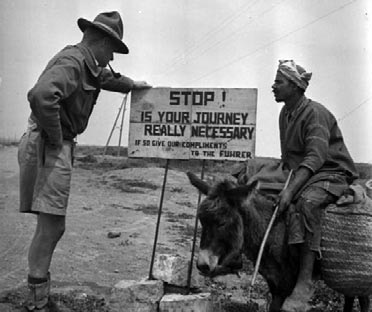The coronavirus has closed education down everywhere, but when the world opens up, it is educational travel which is most at risk, say Melanie Butler and Ron Ragsdale
It is an unfortunate fact that when faced with any quandary, from Brexit to a football final, the standard British response is to start blethering on about the Blitz and how in our finest hour we stood alone. This is particularly irritating if you are an Indian, an Australian, a Canadian or indeed the citizen of any country which fought shoulder to shoulder with the British throughout the Second World War.
In this time of coronavirus, however, the standard, stock UK slogans from the Second World War can still come in handy. “We’ll meet again,” says Queen Elizabeth to her locked down people. “This is not the beginning of the end,” says the Governor of New York, quoting Churchill, “but it may be the end of the beginning.”
“It’s a question parents and governments will still be considering as the virus diminishes, and students can once again consider travelling overseas to do a course.”
“Is your journey really necessary?” ask almost all governments almost everywhere.
As we report on page 7, Australia asked this just as it issued its strategy to become number one in language travel. It chose to keep its borders closed. So, too, did Thailand, as the country put out a call for more foreign teachers to come and work in its schools.
As we report in Global News, the UK, one of the few countries to keep is borders open, did not initially extend to its private language schools the tax relief promised to the travel industry. It left this to local governments. We should not be surprised, then, by the rumours that it is also refusing to bail out the UK university sector, which faces a £2 billion drop in income as international student numbers dry up.
Is this journey really necessary? It’s a question parents and governments will still be considering as the virus diminishes and students can once again consider travelling overseas to do a course.
For universities, colleges and language schools in the English-speaking world the answer may no longer be simple. As Chris Etchells explains on page 38, in his campaign to make language teaching more eco-friendly: “The coronavirus crisis has shown that online learning can be effective and enjoyable… If you expect students to travel to your school, you need to be clear why this is better.”
There is little doubt that online teaching has become ubiquitous. As we show on page 25, even Cambridge Assessment has capitulated to coronavirus and allowed Celta trainees to do their teaching practice online.
It is also true that we have known for years that adult blended learning courses, such as the one for Kazakh journalists we highlight on page 12, have outcomes as good as, or better than, face-to-face courses; and, in some cases, teacher-led online learning is as good as a classroom. Except, American studies suggest, for children under the age of 12.
It remains unlikely, though, that all study will move online. But local programmes, such as the EAP courses described by Dianne Schmidt of NCUK on page 14, may have an advantage over ones which require students to get on a plane.
Local language schools, local English medium universities and local bilingual high schools, all are likely to bounce back in each country as lockdowns are lifted. Learning English, after all, remains essential.
But whether travelling to learn English, or travelling to learn in English, we will need to answer the question, “why is this better than doing it at home on your computer or in your own hometown?”
Management gurus agree that if you want a competitive advantage you must be two of the following: cheaper, faster, better or greener. And then you have to prove it.







